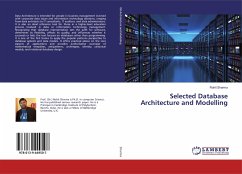
Selected Database Architecture and Modelling
Versandkostenfrei!
Versandfertig in 6-10 Tagen
41,99 €
inkl. MwSt.

PAYBACK Punkte
21 °P sammeln!
Data Architecture is intended for people in business management involved with corporate data issues and information technology decisions, ranging from data architects to IT consultants, IT auditors, and data administrators. It is also an ideal reference tool for those in a higher-level education process involved in data or information technology management. Recognizing that database representation sets the path for software, determines its flexibility, affects its quality, and influences whether it succeeds or fails, the text focuses on databases rather than programming. It is one of the first...
Data Architecture is intended for people in business management involved with corporate data issues and information technology decisions, ranging from data architects to IT consultants, IT auditors, and data administrators. It is also an ideal reference tool for those in a higher-level education process involved in data or information technology management. Recognizing that database representation sets the path for software, determines its flexibility, affects its quality, and influences whether it succeeds or fails, the text focuses on databases rather than programming. It is one of the first books to apply the popular patterns perspective to database systems and data models. It offers practical advice on the core aspects of applications and provides authoritative coverage of mathematical templates, antipatterns, archetypes, identity, canonical models, and relational database design.












